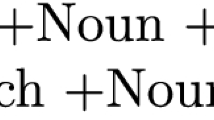Abstract
Word recognition and generation is a fundamental part of the processing of natural language, especially for languages with rich morphology such as Modern Greek, and it requires computationally effective morphological processors. Various models have been proposed for developing computerized systems to accomplish the task of recognition of morphosyntactic features of words. In this paper there is a description of extending and adapting the model of functional decomposition in order to cover a number of morphological phenomena that are encountered in Modern Greek. To achieve a more efficient word recognition modifications on the original model were introduced, the lazy word-parsing approach been adopted. The proposed system was used for processing a large scale corpus and the results are presented and discussed as well.
Access this chapter
Tax calculation will be finalised at checkout
Purchases are for personal use only
Preview
Unable to display preview. Download preview PDF.
Similar content being viewed by others
References
J. Allen, M.S. Hunnicutt and D. Klatt, From Text to Speech: The MITalk System, Cambridge University Press (1987).
S. Ananiadou, A. Ralli, A. Villalva, The Treatment of Derivational Morphology in a Multilingual Transfer-Based MT System-EUROTRA, Proceedings of SICONLP’ 90 (1990).
K. Church, Morphological decomposition and stress assignment for speech synthesis, ACL Proceedings, 24th Annual Meeting (1986).
E. Dermatas and G. Kokkinakis, Text-to-Speech Formant Synthesis of Greek and Applications, Proceedings of the Language Engineering on the Information Highway Conference, Santorini (1994).
E. Dermatas and G. Kokkinakis, The performance of the TTS-system and possible applications are discussed. Multilingual text-labelling and Stress Assignment, Proceedings of the Language Engineering on the information Highway Conference, Santorini (1994).
E. Dermatas and G. Kokkinakis, LEXITHIRAS: Multilingual Corpus based Lexicography on PCs, Proceedings of the Language Engineering on the Information Highway Conference, Santorini (1994).
A. Draggiotis, A parsing technique for resolving syntactic ambiguities in Greek sentences, Working Papers in NLP, Ekδóσειζ, δίαυλoζ, A0ήvα (1997).
E. Dura, Lexicon and Lazy Word Parsing, Proceedings of the Language Engineering on the Information Highway Conference, ISP Santorini (1994).
T. Kalaboukis, Suffix Stripping and Retrieval with Retrieval with Modern Greek, Proceedings of the Language Engineering on the Information Highway Conference, Santorini (1994).
I. Κωτσǵaνης, пεριγρǵaφοντας ην ομαλή κλτική μορφ ολογία της Ελληνικής λέζης με ενοοιητική γραμματική, ΕΜП (1986).
G. Markopoulos, A two-level description of the Greek noun morphology with a unification-based word grammar, Working Papers in NLP, Εκδόσεις Δίανλος, A0ήνα (1997).
D. Packard, Computer-Assisted Morphological Analysis of Ancient Greek, Innovative Projects in University Instruction, University of California (1977).
A. Ralli, Morphologie Verbale et la Theorie du Lexique: Quelques Remarques Preliminaires, Пρακτικǵa της 4ης Ετήσιας συνǵaντησησυνǵaντghτης του Τομέα Гλωσσολογίας του Αпθ (1983).
A. Ralli, Morphology, Prep.Phase, Volume I, Chapter 2, Eurotra-Gr (1985).
A. GPǵaλλη, ΚΛAΙσΗ KAI ΠΑGPΑΓΩΓΗ, Πρακτικǵa της 7ης Ετήσιας συνǵaντησης του Τομέα Γλωσσολογίας του ΑΠθ (1986).
A. Ralli, Elements de la morphologie du grec moderne: la structure du verbe, PhD diss., Universite de Montreal (1988).
A. Ralli, Compounds in Modem Greek, Rivista di Linguistica, Special issue on Compounds, Scuola Normale Superiore, Pisa (1992).
A. Gpǵaλλη, H θεωρία των GXαρακτηριστικών και η Δομή των Κλιτών Λέξεων τλς Νέας Ελληνικής, Πρακτικǵa της 13ης τήσιας συνǵaντησης του Τομέα Γλωσσλογίας του ΑΠΘ (1992).
A. Ralli, Feature representations and feature-passing operations: the case of Greek inflection, Proceedings of the 8th Linguistic Meeting on English and Greek, Thessaloniki (1994).
A. Ralli and E. Galiotou, A Morphological Processor for Modern Greek, Proceedings of the 3rd European ACL Meeting, Copenhagen (1987).
A. Ralli and E. Galiotou, Affixation in Modern Greek: A Computational Treatment, Proceedings of EURISCON’ 91 (1991).
K. Sgarbas, N. Fakotakis, G. Kokkinakis, A PC-KIMMO-Based Morphological Description of Modern Greek, Literary and Linguistic Computing, Vol. 10, No. 3, Oxford Univ.Press (1995).
R.W. Sproat, Morphology and Computation, MIT, USA (1992).
A. Τουραζίδης, Μετασχηματισμοί Фυσικής Γλώσσας κ=gaι Εϕρμογές σε Διόρ0ωση Ορογραϕικών Λα0ώνκαι Ελληνική στενοτυπία, Διδακτορική διατριβή, Tμήμα Ηλ.Μηχ.-Μηχ. GYπολ/ΕΜΠ (1991).
L. Touratzidis and A. Ralli, A Computational Treatment of Stress in Greek Inflected Forms, Language and Speach, 35(4):435–453 (1992).
Θ. Τριαντούλου, X. Τσαλίδης, Δ. GXριστοδουλǵaκης, InterLEX: Míα CF προσέγγιση για τη μορϕογική περιγραϕή της Ν.λληνικής, 13η συνǵaντηση εργαίας του Τομέα Гλωσολογίας του ΑΠΘ (1992).
Author information
Authors and Affiliations
Editor information
Editors and Affiliations
Rights and permissions
Copyright information
© 2000 Springer-Verlag Berlin Heidelberg
About this paper
Cite this paper
Papakitsos, E., Gregoriadou, M., Ralli, A. (2000). Functional Decomposition and Lazy Word-Parsing in Modern Greek. In: Christodoulakis, D.N. (eds) Natural Language Processing — NLP 2000. NLP 2000. Lecture Notes in Computer Science(), vol 1835. Springer, Berlin, Heidelberg. https://doi.org/10.1007/3-540-45154-4_3
Download citation
DOI: https://doi.org/10.1007/3-540-45154-4_3
Published:
Publisher Name: Springer, Berlin, Heidelberg
Print ISBN: 978-3-540-67605-8
Online ISBN: 978-3-540-45154-9
eBook Packages: Springer Book Archive





